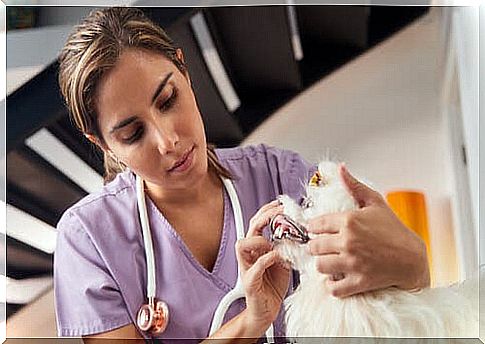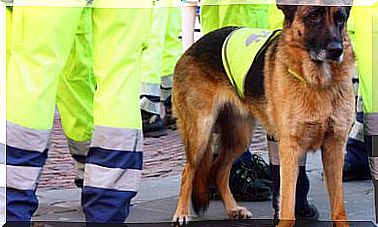Muscle Cramps In Dogs: What Can You Do About It?

Muscle spasms in dogs can be the result of a specific problem. They often occur after excessive exertion, neurological damage, or physical injury.
While muscle spasms are not dangerous in themselves, they can be very painful – especially if they last for long periods of time. However , they can also be a sign of a more serious condition, such as a pinched nerve, a herniated disc, or brain damage.
In addition, some causes of muscle spasms in dogs are directly related to neurological disorders that commonly cause convulsions.
What are muscle cramps in dogs?
It is important to remember that dog convulsions, epileptic or not, consist of a variety of repetitive muscle spasms. The origin of these spasms is related to electrical activity in the brain.
In addition, muscle spasms in dogs are unrelated to such convulsions. When they appear in isolation and only once, it is generally a less severe problem.
Therefore, it is important that you understand the specific causes of muscle spasms before attempting to treat them on your own. If you suspect your dog is having spasms, you should see a veterinarian immediately. In today’s article, we’re going to talk about the things you should keep in mind during your appointment.
Muscle Spasms in Dogs: What Are the Causes?
First of all, you need to understand that there is more than one cause of muscle spasms in dogs. Each cause has its own systems and is treated specifically.

1. Muscle cramps during sleep
During the deep sleep phase, your dog’s brain experiences higher levels of activity. This could explain why some dogs (and humans) twitch in their sleep.
If you suspect your dog may have cramps while sleeping, you should try gently waking him up. If everything is okay with him, he will wake up immediately. However, if he is having a non-epileptic seizure, it will be much more difficult to wake the animal.
2. lesions
A dog’s muscles, bones, veins, and cartilage form a complex system. Therefore, muscle problems are often related to or cause joint problems.
When your dog has a joint or muscle injury, the muscles around it stiffen and harden. As a result, muscle cramps can develop. In general, such lesions will cause your dog to limp or change their gait.
If your dog has suffered head trauma, the brain’s altered ability to calculate and coordinate movements of the extremities can also lead to muscle spasms
3. Hypoglycemia
While this is a rather unusual condition, low blood sugar levels can also cause muscle cramps and spasms in hypoglycemic dogs.
4. Overexertion

If dogs play too long or become extremely exhausted, their muscles can be damaged from the intense activity. If your dog has been outdoors for a long time without drinking water, it can lead to serious dehydration and heat stroke. These are also possible causes of muscle cramps.
5. Muscle cramps due to poisoning
Poisoning is more common in dogs as they tend to ingest substances that are unsuitable for consumption or toxic.
Staggering is a crucial trait and sign that a dog has suffered poisoning. However, many dog owners often mistake this symptom for muscle cramps. If left untreated, dog poisoning can lead to kidney failure and serious complications.
6. Canine distemper
Canine distemper is a viral disease that can affect puppies as well as adult dogs that do not have adequate vaccination protection. This condition can cause a variety of symptoms, including muscle spasms.
7. Canine Stress Syndrome
This is a neurological disorder that certain breeds, such as the Labrador Retriever, are particularly susceptible to. Studies have shown that excessive dog training can also be a trigger.
When should you see a veterinarian if your dog has muscle cramps?
You should see a veterinarian immediately if your dog has muscle cramps, unless you are absolutely sure that the situation is unique. If the spasms are persistent, or if your dog is vomiting or lethargic, then there is particularly urgent need for action.
- If your vet suspects poisoning, your dog will be given an injection that induces vomiting. He will also be given intravenous fluids.
- In all cases where dogs have muscle spasms or convulsions , the veterinarian will order blood tests to check enzyme levels in important internal organs.
- If your dog is limping, or has recently suffered a fall or other injury, the veterinarian will perform an x-ray or CAT scan.
- If the vet suspects epilepsy or other neurological disorder, they will likely do tests such as an EEG. These tests document and register the electrical activity in the animal’s brain.
- If the veterinarian diagnoses your dog with epilepsy, he or she will prescribe anti-epileptic treatment to stabilize the dog. These medications are designed to lower your dog’s seizure threshold as much as possible.
- Other laboratory tests can include urine tests, stool examinations and the analysis of cerebrospinal fluid.
How to care for your dog at home

Based on the diagnosis made by the veterinarian and under his or her guidance, you can take appropriate measures to relieve your dog. These measures can even help prevent your dog from having any more muscle spasms in the future.
Depending on the cause of the convulsions , additional treatment may be needed to correct the root cause. This could be physical therapy sessions, massages, or surgery to remove the affected nerve or the cause of the muscle spasms.
The best way to treat muscle spasms in dogs is to prevent them. Therefore, both during and after dog training or other strenuous activities, you should make sure that your dog always has plenty of water available and that it remains adequately hydrated, especially on warmer days.









